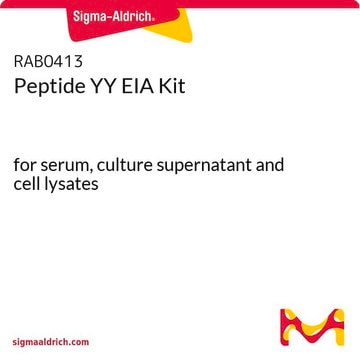EZRMGIP
Rat/Mouse GIP ELISA Kit
measures and quantifies GIP levels in 10 μL serum, plasma or cell culture supernatent
Synonym(s):
Gastric inhibitory polypeptide, Glucose-dependent insulinotropic polypeptide, Incretin hormone
About This Item
Recommended Products
product name
Rat/Mouse GIP (total) ELISA, This Rat/Mouse GIP (total) ELISA is used to measure & quantify GIP levels in Metabolism & Endocrine research.
Quality Level
species reactivity
mouse, rat
packaging
kit of 1 × 96 wells
parameter
10 μL sample volume (4hr assay)
assay range
accuracy: 104.2%
linearity: 100.8%
sensitivity: 8.2 pg/mL
standard curve range: 8.2-2000 pg/mL
technique(s)
ELISA: suitable
input
sample type cell culture supernatant
sample type plasma (K2 EDTA)
sample type serum
application(s)
research use
detection method
colorimetric (450nm/590nm)
shipped in
wet ice
storage temp.
2-8°C
General description
Application
Disclaimer
Signal Word
Danger
Hazard Statements
Precautionary Statements
Hazard Classifications
Acute Tox. 3 Dermal - Acute Tox. 4 Inhalation - Acute Tox. 4 Oral - Aquatic Chronic 2 - Met. Corr. 1 - Skin Sens. 1
Storage Class Code
6.1C - Combustible acute toxic Cat.3 / toxic compounds or compounds which causing chronic effects
Regulatory Listings
Regulatory Listings are mainly provided for chemical products. Only limited information can be provided here for non-chemical products. No entry means none of the components are listed. It is the user’s obligation to ensure the safe and legal use of the product.
JAN Code
EZRMGIP-55BK:
EZRMGIP-55K:
Certificates of Analysis (COA)
Search for Certificates of Analysis (COA) by entering the products Lot/Batch Number. Lot and Batch Numbers can be found on a product’s label following the words ‘Lot’ or ‘Batch’.
Already Own This Product?
Find documentation for the products that you have recently purchased in the Document Library.
Our team of scientists has experience in all areas of research including Life Science, Material Science, Chemical Synthesis, Chromatography, Analytical and many others.
Contact Technical Service








